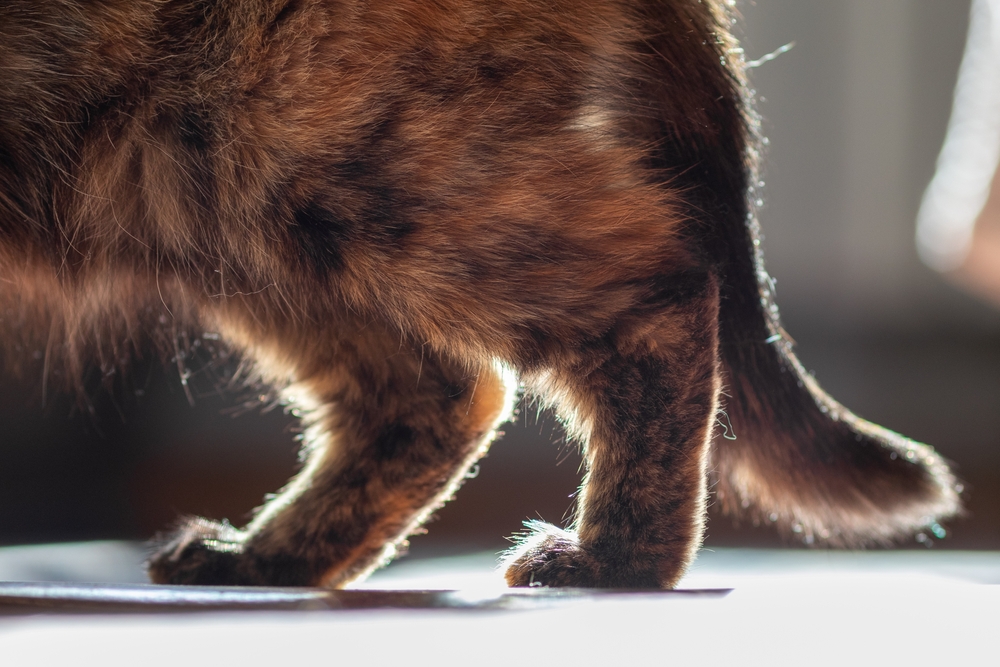Feline arthritis is a progressive, inflammatory joint disease that affects more than 90% of cats by age 12. Unfortunately, early arthritis signs are subtle and often dismissed by pet owners as normal aging or another disorder, which can delay diagnosis and treatment. The Aloha Veterinary Hospital team helps cats live their best lives with arthritis screening at each visit and safe, effective therapies to address pain or discomfort.
What is feline arthritis?
Arthritis, also called osteoarthritis or degenerative joint disease (DJD), is characterized by joint cartilage degeneration that progresses to worsening inflammation, pain, and reduced mobility. Arthritic cats may hide their pain and go undiagnosed and untreated for long periods. Studies show that some cats’ arthritic changes are visible on X-rays by age 6, and nearly all cats are affected by the disease in some way by age 12. Although arthritis isn’t curable, early intervention can slow progression and promote comfort.
Feline arthritis causes
Joint inflammation and progressive damage are arthritis hallmarks. Although we don’t know what triggers the inflammatory cycle, cats with specific attributes are more likely to develop arthritis. Predisposing factors include:
- Age — Senior cats are more likely to develop arthritis.
- Obesity — Excess weight puts mechanical stress on joints and encourages systemic inflammation, accelerating cartilage breakdown.
- Trauma or injury — Previous injuries or malformed joints can lead to earlier arthritis development.
- Genes — Some cats are genetically predisposed to earlier or more severe arthritis.
Feline arthritis signs
Cats often mask pain, but you may notice subtle to obvious arthritis signs at home once you look closely. Possible signs include:
- Decreased activity
- Climbing stairs closely
- Hesitancy to jump up or down
- Inadequate grooming
- Litter box issues
- Behavioral changes
- Limping or stiffness
- Muscle loss
- Awkward sitting or laying positions
Our team can diagnose feline arthritis with a thorough history, physical examination, and X-rays. Sometimes, we diagnose arthritis incidentally when taking X-rays for another reason.
Feline arthritis treatment options
Feline arthritis requires a multimodal approach to reduce pain and improve functional mobility. Our team relies on the following effective treatments to improve your arthritic cat’s quality of life:
- Monoclonal antibody therapy — Solensia is an injectable, once-monthly monoclonal antibody therapy that targets the pain pathway in arthritic cats. This treatment has been proven safe and effective in reducing pain and eliminating the need for stressful daily medication administration at home.
- Glucosamine supplements — Glucosamine and chondroitin are naturally occurring cartilage protectants used frequently in joint health supplements. Liquid, powder, or chewable supplements are easy to incorporate in your cat’s diet.
- Pain medications — Gabapentin helps manage chronic arthritis pain in cats and can be used safely with other treatments. We may also prescribe additional pain medications or anti-inflammatories for short-term relief.
- Laser therapy — Laser therapy uses light energy to alter cell metabolism and reduce inflammation and pain in affected joints. Cats tolerate the noninvasive treatment well. We recommend frequent laser sessions at first and then tapering to a maintenance schedule once your cat feels better.
- Appropriate nutrition and weight management — Maintaining a healthy weight is crucial for arthritis management, because obesity exacerbates joint pain, reduced mobility, and inflammation. Diets formulated to assist in weight loss and reduce inflammation can support your cat’s overall health.
Helping arthritic cats cope

In addition to your cat’s prescribed treatments, help them feel more comfortable at home by:
- Providing several soft beds around the house
- Installing ramps or steps to help your cat access favorite spots
- Keeping food, water, and litter boxes easily accessible on each floor
- Cutting low entries into high-sided litter boxes
- Brushing or bathing cats to assist with their grooming
Arthritis doesn’t have to slow your cat down or prevent participation in their favorite activities. Contact the Aloha Veterinary Hospital team to schedule a wellness visit and arthritis screening or to discuss our advanced treatments that will help your furry pal live pain-free.







Leave A Comment